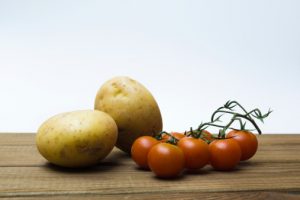
The agency believes this is problematic because sticking to the same vegetables limits your intake of nutrients and contributes to deficiencies. Dana Angelo White, a nutritionist, said, “Variety is so important in a healthy diet across the board. While focusing on only a small number of fruits and vegetables is better than nothing, it still makes it difficult to meet your needs for essential nutrients.”
It’s one thing to eat an actually potato, but it seems the bulk of potato consumption is actually occurring in the form of french fries and chips, which runs the risk of added fats and even less nutrients.
The same trend was seen with tomatoes – only 20 of the 66 pounds of tomatoes for each person were fresh, the rest came from canned sauces or ketchup.
Although it may seem like America is a tomato and potato nation, the USDA suggests the numbers are now improving. In 1970 potatoes, tomatoes and lettuce accounted for two-thirds (67 percent) of crops grown in America – today that number has gone down to 59 percent.
Although tomatoes offer more nutrients than potatoes, sticking with only tomatoes still limits your nutrients. White added, “Tomato and tomato products will offer valuable nutrients as well, but still fall short compared to a diet with more variety.”
The best way to eat a healthy diet is to enjoy variety. Different vegetables offer different nutrients, and by only sticking to the same ones you’re denying yourself essential vitamins and nutrients, which are required for overall good health. Better yet, if you want the most out of your vegetables, avoid frying them or eating them in processed form because they lose their nutrients that way.